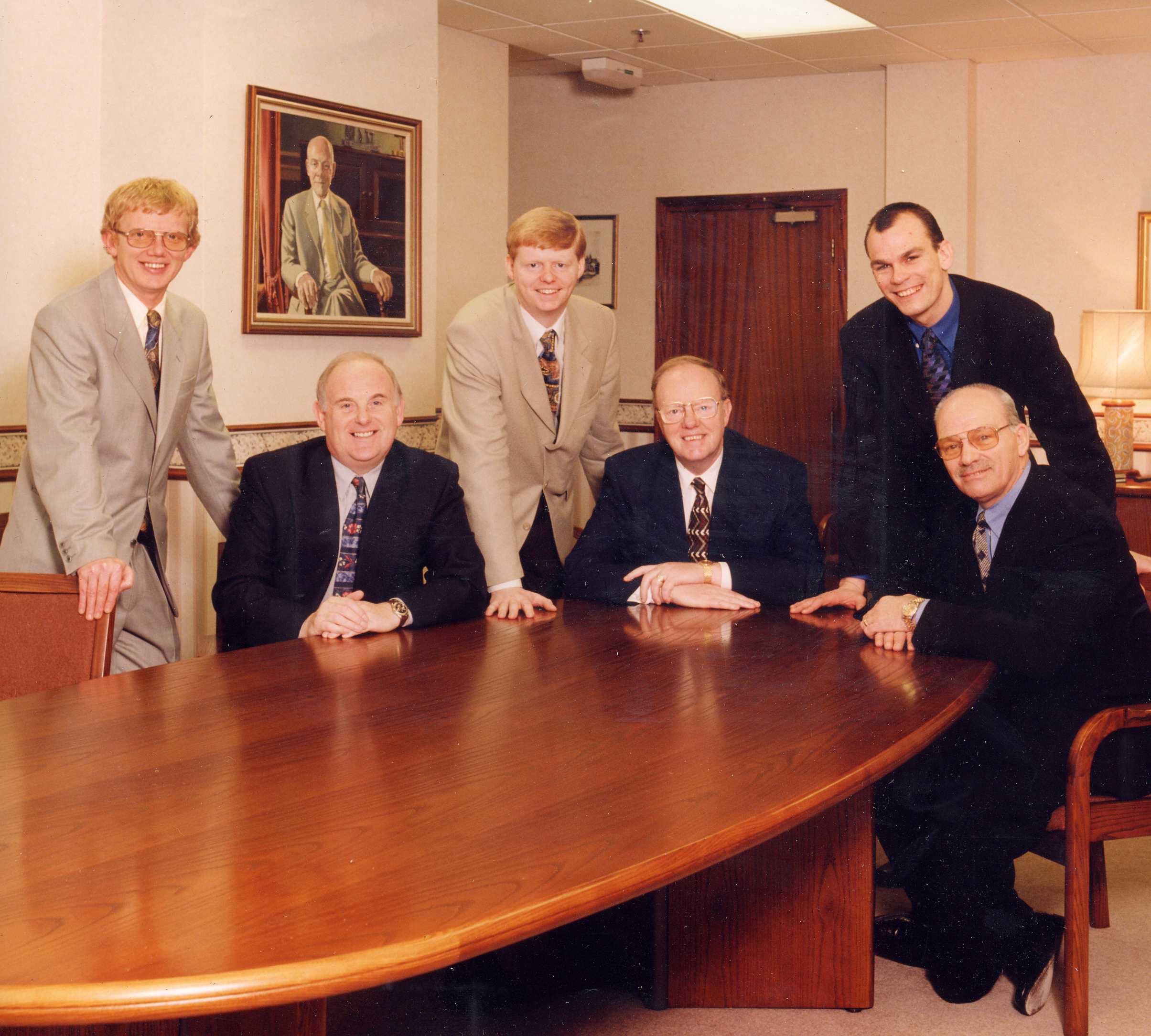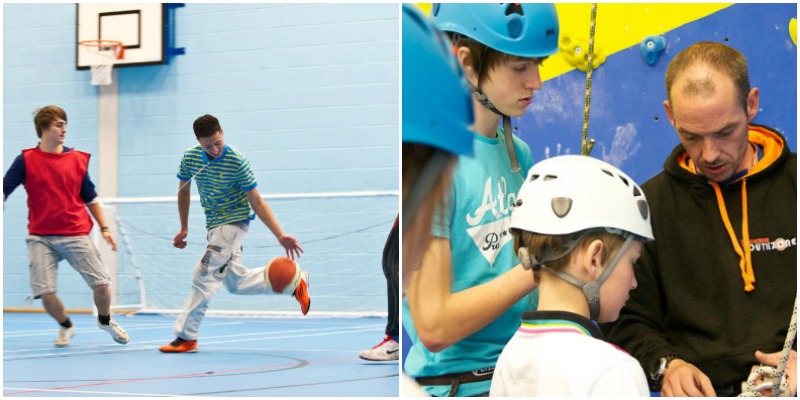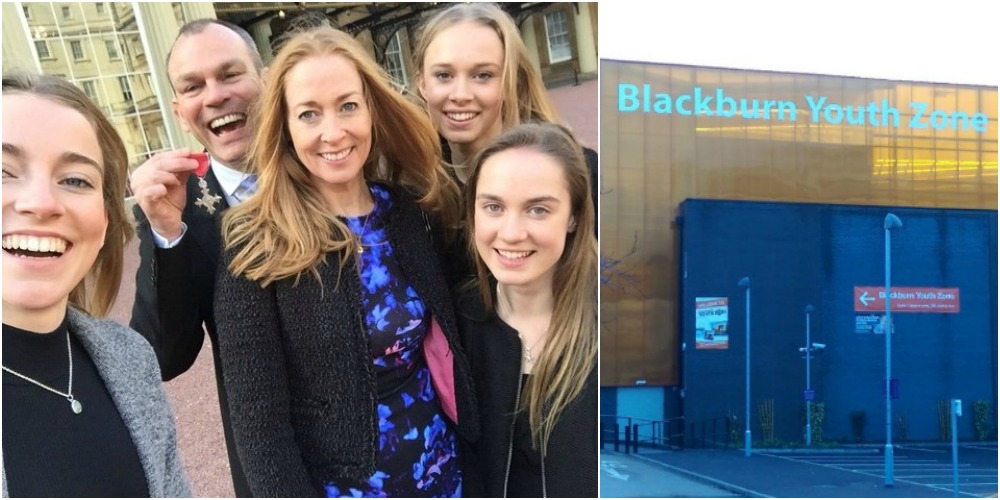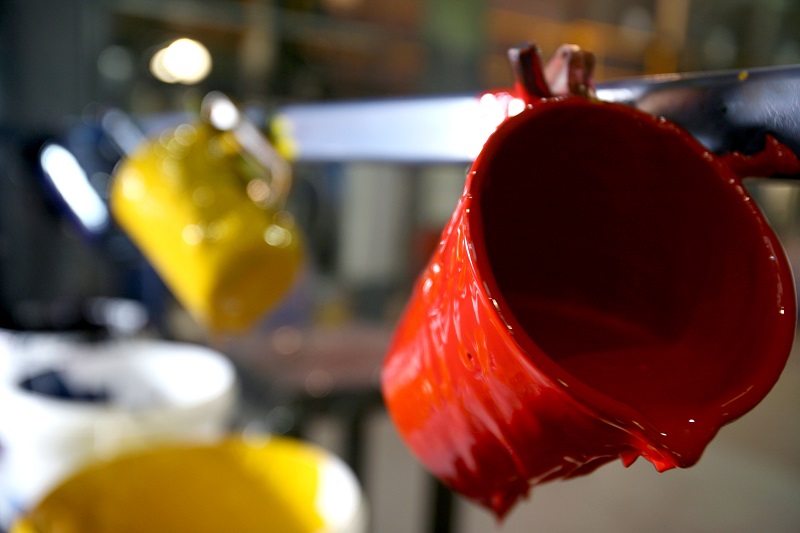When was the moment you decided that joining Graham & Brown was the right move for you?
I worked at the company as a teenager in the summer holidays earning some pocket money so I’d had an association with Graham & Brown, I knew the business and the people in it.
I spoke to my dad a lot about the business because I studied economics and business at university, so I there was genuine interest in the business. You find that a lot with families that own businesses though, they tend to talk about business naturally. But when I went to Newcastle University at 18, I really had the intention to go and work for somebody else first because I felt that I wanted to improve myself but even though Graham & Brown was quite a reasonable size, it was very much a family business. I was a bit concerned about what would I do.
But that never happened because in 1991 G&B bought 2 factories from the another business that went in to receivership. And as a result of that G&B expanded overnight, it had doubled in size; It was a very exciting period. At the end of that first year of merger G&B got organised and started to recruit people because of the size of the business. It was then that my father approached me looking for young marketing and sales assistants to join the business and get involved so if I wanted to join, now was a good time because there was the opportunity. So I thought about it and that’s what I did, I joined after I got my degree.
I did slightly regret it at the time if I’m honest, it’s the only business I’ve ever known. I wish I’d had a bit more personal experience before I came in to the business but I don’t regret it now, it’s just in looking back I’d certainly have done something else first.

Before Graham & Brown, where would you have seen your career going?
A lot of my friends went to London and worked in the financial services business which at the time, in the early 90's was what a lot of young people with business and economics degrees did. So I would have probably done something like that. But I never got that far.
Having worked from the bottom up, within various departments in the business, which would you say interested you most?
That's quite interesting because we weren't as organised as we are today, we have an induction programme, new starters meetings etc.
So when I joined there wasn't really a job for me to do which I was quite concerned about and I didn't see my Dad at all because he was running the place and I didn't see the rest of my family members in the business as they were all doing their own jobs.
They put me in the sales office and I worked in there for 3 months just doing simple sales administration, which at the time I thought was pretty boring but in hindsight was probably a good thing because I learnt the job from the bottom up. As I got to know the management team and the business I was then asked if I could build my own induction programme and went around the business and spent a month in distribution a month in the factory and so on, and built a bit of experience.
If I'm really honest, I was chomping at the bit to do something that I thought was a real job and I was fortunate that when one of the sales team went on maternity leave I was offered a job to stand in selling wallpaper in the North East of England and Scotland to our customers in independent retailers. So I started to do that and I absolutely loved it
If I was given the opportunity I would try to go in to every department, I think if you want to learn about wallpaper really well then being a product manager is a great place to start because you get to understand how things are designed and manufactured and that gives you a really good grounding.
But I really enjoyed selling so when it came to it, my passion was to sell.
As a keen rugby player, how have the elements of leadership and teamwork within this sport translated in to running a company?
One of the only reasons I went to University was to play rugby. I managed to get a pretty good degree as well, some would say it was quite amazing with the amount of rugby that I played.
Sport teaches you that things go wrong, that's probably the first thing you need to understand in business. We have an aspiration of how things are going to play out and then, very often in life, as hard as you try you still don't win. Something knocks you back and it's that resilience that really makes people strong in life generally. I learnt that through rugby because you have to recognise that when you go on to the pitch there's only going to be one winner. Very often you want it to be you but sometimes it isn't.
The teamwork aspect of these types of sport is a very good lesson for business because you try your hardest but actually one person on their own doesn't achieve a great deal, so creating a team culture where everybody can get involved, where everybody can bring the best of themselves, that's what makes a good team.
I think that's what makes a good business. It's probably obvious in my leadership style that I encourage people to work together because I believe we're stronger together than on our own. You get to understand other people, particularly when you're building a senior team, you don't want people of all the same characters. Although you think you do when you're younger, you tend to gravitate towards people that have similar interests or see the world in a similar way but when you get older and gain a bit more experience, perhaps when you're in a leadership role of a business, you realise that you need people who come from different backgrounds and experiences; Rugby definitely teaches you that.
But it is about winning for me. At the end of it all though, I'm still massively competitive and even when we might get knocked back I never lose my desire of winning. I just don't think it's worth being involved in something if you don't want to be the best at it. That doesn't necessarily mean you are going to be the best at it but why shouldn't your aspiration be to be the best at it. When I joined G&B we weren't even in the top 10 wallpaper companies in the UK but we always had the aspiration to be the best. Now we have a global aspiration to be one of the best businesses in our sector in the world.
People shy away from big goals because they're afraid of failure but if you listen to Eddie Jones talking about the England rugby team, he always talks about the world cup final in 3 years time. He's making it absolutely apparent that the job of that collective group of people is to be the best team in the world, not necessarily today but at some stage in the future. What a world cup does is defines a day and time that you have to be the best in the world, but that's his aspiration.
FAMILY BUSINESS
Being a very family orientated business, switching off at the end of the day must be quite tasking; how do you find time to unwind and think away from wallpaper?
Not quite at the end of the day, I'm constantly engaged in the business but I don't mind that at all. So even if I'm on holiday I'm looking at my emails; I'm looking at the figures but I'm not necessarily working. So it's not the end of the day that I switch off but I do have quite a routine in terms of exercise in my life and that's how I switch off really.
I do quite a lot of physical exercise, including a lot of physical sport; skiing, tennis, yoga and swimming. I tend to have a structure throughout the week that I apply to give me that down time. In between all of that I'll go for a couple of walks around where I live in my local village and it's that sort of repetitive physical exercise that I find really relaxing. My mind de-layers everything, so I use that process to clear my mind and file everything away. I do ski in the winter and when you're skiing you can't really be thinking about anything else, so that's a good sport to get away from it.
But I'm never away from it, Im always thinking about what we should be doing next or looking for other ideas. fortunately, a lot of my friends run and own businesses so even when socialising Im talking to them, we exchange ideas to give us an advantage.
You have 3 daughters, the eldest of which isn't far off the age you were when you started at G&B, how do they feel about working for the family business in their futures?
Well I'm not guaranteeing that they will come to Graham & Brown. The way I think about the business is that is has gotten to such a stage in its development and to such a size, that actually it needs the best team running the business that we can recruit.
Before they apply to work with anybody, I would expect them to get a good education and find out what makes them tick and what they do like. So I have no expectation at all that they should come in to the business. If they asked me, I would encourage them to explore other experiences because you really need to live your life a bit.
If they did all of those things and they still wanted to join the company, it would be no different to anybody else wanting to join G&B. They would have to apply to a job that exists within the company and win that application process; if they got it then they would get it on merit. I firmly believe that they shouldn't be treated any different to anybody else because I want the very best people running this business. If you're the best person to do my job in the future, you should do it. It's not about your surname or whose son or daughter you are; it should be around the very best person.
Being from Blackburn, how important is it to you to give back to your community?
Aside from myself, the Graham & Brown families have always lived in this part of the world; as have a lot of the people who have worked at G&B. So if you're part of a community and you get the opportunity to give something back, then why wouldn't you? Because the people that you're helping are the people that are working with you.
The Youthzone was a particular project where they needed a founding sponsor, a local business person, who could connect the dots around the town. So because G&B had been here for 60 years, with a good reputation, I suppose we were one of the obvious picks. So I got asked to do the job of founding it and bringing it alive. I think it goes back to what we touched on before; I've never started a business and I've always had that itch; could I do something from scratch? Could I have done what Harold and Henry (the first generation of Graham & Brown) did and create something out of nothing? I think when you start a business or charity and you look forward, there are more obstacles in your way than anything. I've got a huge admiration for people who start their own businesses.
The most satisfying thing for me personally was that I managed to overcome a huge amount of obstacles to get it off the ground in the first place. We set about engaging the entire community to help us and it's been wonderful how everyone has reacted in supporting the charity.

We've got 800-1000 young people coming through the doors, some are under privileged, a lot are just ordinary young people and there's some that have more of a difficult upbringing, but they're all trying to work out, at a very young age these days, where their relevance in life is. You put the news on and the school system is under pressure, everyone's cutting activities and as a young person growing up with youth employment being very high and having just voted to leave the EU, young people probably feel a bit disillusioned. So the real satisfying thing for me, and for Graham & Brown to be involved in it, we try to give those young people a bit of hope and aspiration, maybe trying to find that spark in them that makes them go on and start a business in Blackburn or become an employer.
when I look at it now opening it was actually the easiest thing, although at the time it felt like the hardest thing. Looking down the road, how we keep this thing going is a huge responsibility but it's like everything else you just need to engage as many people as possible to keep going.
You were honoured with an MBE in Services to Manufacturing and voluntary service to young people in Lancashire in 2016, what did this mean to you?
I never expected that. In fact, there's a funny story in which I had come home from work and with having 3 teenage daughters, there's always quite a lot of stuff around. So the post hadn't been opened for a couple of days and my wife mentioned that there was an official looking letter for me, could be a bill or something, so I turned it over and on the back of it and there was one of the kid's homework scribbled on the back of it. So I opened it up, not really expecting anything and it was a letter inviting me the accept the honour of an MBE. So I have to tell you, I cried, which may surprise you. My wife cried as well because it was just such a shock and when you get recognised for something like that its quite powerful.

They gave it to me for Blackburn Youthzone and Graham & Brown, certainly more in my mind for Blackburn Youthzone but it was a reflection on how everybody had worked hard to do the impossible which was to build this mega youth club in the centre of Blackburn. A lot of people have tried to write Blackburn off and that's why I quite like fighting for the underdog. A bit like wallpaper, wallpaper was finished 10 years ago or so they told us and G&B have reinvented it, making it the most fashionable product in our sector and I feel a similar way towards Blackburn, I think it's had a lot of bad press.
It's got a lot of entrepreneurial people in it with great businesses and a lot of great young people so I like fighting for its profile and I'm absolutely delighted that Wayne Hemingway is bringing the National Festival of Making up here in May because that will really help to change Blackburn's image. Blackburn is a great place to build a business and a family but people just don't realise it.
G&B AND THE FUTURE
What keeps G&B exciting for you?
I just don't feel like we've finished the project yet. Looking to Alex Ferguson's book on leadership what was interesting was that he had to build 4 different teams over the course of 20 years and each time he had to change the manner in which that team played football because the quality of the opposition was getting better and better.
I've been Chief Executive for 10 years and when I look back at the first 5 years, I had a lot of enthusiasm but I didn't really have a lot of experience on building a winning structure. We did very well during this time and the business had its most successful period in the company's history in terms of profitability but that wasn't just down to my leadership there was a lot in place when I took over. So I think I was a bit naïve because I thought we'd cracked it and that's obviously dangerous in anything.
Then we went through a few tricky years and I had to rethink how I wanted to take the business forward. I had to change quite a lot of things both in terms of personnel, how we went to market, structure and so I feel like we're in the second phase of my leadership. I think what I've learnt is that we're going to have to continually evolve and that you never actually make it.

So I think I'll be a better leader going forward than I have been because I learnt that the hard way but what keeps me excited is that I think there is so much potential in the people that we've got. I meet everyone that joins our business through the new starters meeting and meet a lot of people through the focus groups. I'm always amazed at how much energy and enthusiasm there is and how engaged they are in the business and I come out of those meetings thinking wow, we really can just keep going.
I have other goals too; I want the business to be more profitable, more global and I'd like the brand to be more recognised a lot more than it already is. So we've still got a lot of unfinished business.
G&B is now 71 years old, how do you keep a manufacturing and design company up to date with trends and style in 2017?
That goes back to building the right structure with the right team. I can't really influence any of that other than creating an environment where the best people in those areas can join this business

We're investing heavily in to our Research & Development department for the same reason because we're trying to look 2-3 years ahead and trying to understand what's going to be different tomorrow. Investing heavily in Digital both in terms of Ecommerce and digital experience. I can't really do anything because I'm not an expert in any of those fields or operations, but what I can do is make sure we've got the right culture to attract the right people to the business and I think that's the key part of my job is to communicate internally and externally the culture that we're trying to create so that the best people stay with us and develop, as well as the best people wanting to join us.
10 years ago, G&B looked very different. How do you see the next 10 years panning out?
It's easy to look backwards isn't it because you've got a reference point. We'll certainly have a bigger ecommerce business. I was having a conversation with my youngest daughter the other day, she's nearly 16, we were talking about business (with her being interested in studying business at A level) and she wondered why anybody would buy anything from a shop, because she never goes to a shop with everything being available to order online.
So I think we've got to think about the consumer and how they can access the products on their terms, in their space, when they want to. So that if they don't stumble in to one of our shops or one of our customer's shops, we've got to be able to communicate with them any time of day through digital media and social. We've got to be able to transact with them as well, so I think that builds the brand because if you have that connection with the customer, then they will go back to retail stores and buy because they've made the connection with the brand. But they probably won't go to the store in the first place to make the connection with the brand, they'll make it through social media.
So in 10 years' time there will be more personalisation, there will be more engagement with the customer about the product and the design; but I don't quite know how. It may well still be printed; it could be projecting our designs on to customers walls. One of the reasons we're investing so much in to our IT department and our digital understanding is because businesses who are going to survive have to be very tech and IT savvy.
I think we'll be more international but I think we'll connect more with customers through the internet than we will physical stores. But if you have an iPhone or a laptop you can really access any product in the world from anywhere.
We'll still be in Blackburn though; the HQ will always be in Blackburn but there's just so much experience here that we won't want to lose. We may well have more satellite operations but I can't imagine us not being in Blackburn